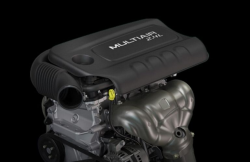
— A Chrysler oil consumption lawsuit has been filed alleging vehicles equipped with 2.4L Tigershark MultiAir II engines burn or consume abnormally high amounts of oil.
The lawsuit alleges vehicle occupants are put in danger because the oil consumption problems cause the engines to suddenly shut down while driving.
And while low oil pressures and stalled engines are allegedly bad enough, the plaintiffs claim the problems could be avoided if the oil indicator systems alerted drivers to low oil levels in these vehicles.
- 2015–2016 Chrysler 200
- 2013–2016 Dodge Dart
- 2016–2020 Fiat 500X
- 2014–2020 Jeep Cherokee
- 2017–2020 Jeep Compass
- 2015–2020 Jeep Renegade
The plaintiffs also allege drivers don't know about dangerously low oil levels until the vehicles suddenly shut down, even though the oil change indicators allegedly don't yet recommend a change of oil.
Fiat Chrysler (FCA US) allegedly knows about oil consumption issues because hundreds of vehicle owners and lessees have complained about their vehicles shutting down due to low oil levels.
The automaker also allegedly knows about the Tigershark engines because a technical service bulletin (TSB) allegedly conceals known defects by telling dealerships the oil consumption problems are normal.
Classifying the low oil levels as normal allegedly provides FCA a way to avoid official recalls as owners spend their own money while trying to diagnose and repair the excessive oil consumption issues.
According to the class action lawsuit, customers complained about underpowered vehicles prior to 2013, causing Chrysler to switch to the larger 2.4L Tigershark MultiAir II engines.
Chrysler allegedly markets the 2.4L Tigershark engines as technology to increase engine power and torque, reduce emissions and decrease fuel consumption. But the lawsuit alleges the MultiAir system won't function properly unless there is strict maintenance of oil volume.
The plaintiffs complain about the oil change indicator systems that receive input from various engine operating conditions to determine when to change the oil, then drivers are warned it's time to change the oil.
FCA says conditions such as frequent short trips, towing a trailer and driving in extremely hot or cold ambient temperatures will influence when the Change Oil or Oil Change Required messages are displayed to drivers.
In addition, the owner's manuals say operating a vehicle in severe conditions may cause the oil message to activate as early as 3,500 miles. Owners are told to change the oil within the next 500 miles.
The manuals also explain the oil should be changed “at 4,000 miles (6,500 km) or 350 hours of engine run time if the vehicle is operated in a dusty and off road environment or is operated predominately at idle or only very low engine RPMs."
The lawsuit alleges in other conditions, the oil change intervals shouldn't exceed “10,000 miles (16,000 km), twelve months or 350 hours of engine run time, whichever comes first. The 350 hours of engine run or idle time is generally only a concern for fleet customers.”
Low engine oil will prevent the Tigershark engine from proper cooling and lubrication, allegedly causing premature wear and failures of the engine. Vehicle owners further complain how dealerships allegedly swear a vehicle shutting down in the middle of a highway is a safety feature.
According to the class action, the Tigershark engines allow oil to escape past the oil control piston rings and into the combustion areas. This is allegedly caused by oil control piston rings that do not function properly with the cylinders in which they operate.
"Although piston rings do not require maintenance, and are purportedly lifetime parts, the rings in Class Vehicles wear down, whereby the oil control piston ring is worn flush with the piston wall, allowing engine oil to be consumed during the compression cycle." - Oil consumption lawsuit
The Chrysler oil consumption lawsuit was filed in the U.S. District Court for the Eastern District of Michigan: Davis, et al., v. FCA US LLC.
The plaintiffs are represented by Hagens Berman Sobol Shapiro LLP, the Miller Law Firm, P.C., and Goldenberg Schneider, LPA.




